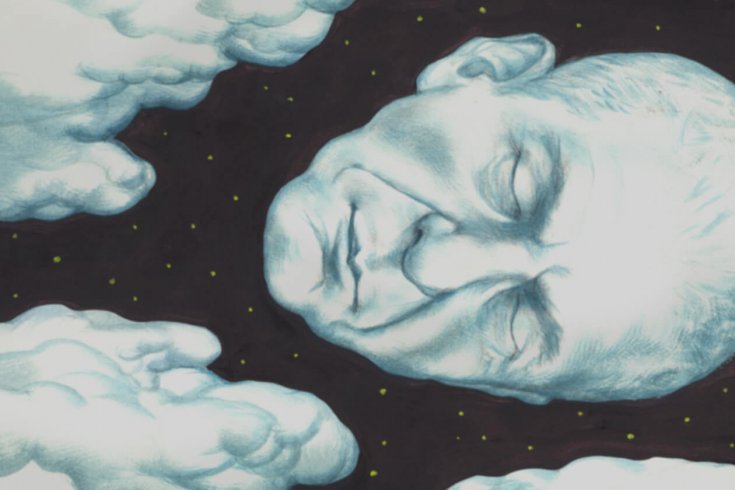It’s probably not advisable to listen to Leonard Cohen’s final album alone in a cabin in the darkness of the Alberta woods after nightfall. And yet, I had no choice. You Want It Darker, the singer’s closing nine songs, could no doubt make the brightest soul feel as if he were in a tiny cell just as the light goes out, hearing the firing squad assemble in the corridor. One can hear a man who began his life singing constantly of travelling and “passing through” come to rest, in absolute stillness. On November 7, 2016, Cohen died in his Los Angeles home at the age of eighty-two.
Nearly all of Cohen’s songs in recent years—dark and grave at the best of times, and ever more elegiac—were about death. It’s a death he spent five years preparing for while living as a monk at the Mount Baldy Zen Center, near Los Angeles, in his sixties, and one that acquired a metaphorical dimension when he came down from the mountain to find that his former manager had apparently defrauded him of his life’s savings. Never averse to self-punishment—especially when it came to outliving death notices—Cohen went on the road again at seventy-three and was reborn, improbably, as one of the world’s most cherished recording artists. The album he released in 2012 at the age of seventy-seven, called, with scrupulous lack of drama, Old Ideas, soared to the top of the charts in seventeen countries.
Yet even that wintry requiem, which began with a song called “Going Home” (about a home that is clearly in the hereafter), and even the more public album he released when he was eighty, Popular Problems (2014), may not have prepared his following for his final word. The title song sounds very much as if it’s addressed to God, and very quickly the singer more or less announces his own death. Cohen’s had always been a world defined by judgment—Kafka-worthy trials and sentencing and “sin”—but that never meant that he believed in justice. At the end of his days, he intones, “I’m ready, my Lord,” but with little expectation that the Lord will be merciful or kind.
In Popular Problems, we heard the singer—whose grandfathers were both rabbis in his hometown of Montreal—shuttling back and forth, always in motion, between the observant Judaism he never relinquished and the Zen practice of slashing through belief in anything, Zen practice included. But in You Want It Darker, such manoeuvres seem almost beside the point. In the face of unanswerable pain, it hardly matters whether God exists or not. The gulf between the final song on his previous record—an upbeat reminder that “You Got Me Singing” (even though the news was bad)—and the first, title song on You Want It Darker, in which Cohen is apparently singing Kaddish for himself, is abject.
Cohen’s readiness to take on issues of faith from every angle—in his first recorded song, “Suzanne,” the observant Jewish seeker was already invoking Jesus as his model—long made him a kind of renegade theologian. From the outset, he dug deep and deeper into the same dense weave of themes, stitching together teaching and suffering and the constant tug between the refuges we find on Earth and the call to some larger and more exacting life. His great gift as a poet was always to write with fierce lucidity about mystery. By the new album’s third song, he’s crooning, “I turned my back on the devil / Turned my back on the angel, too.”
It’s a nice idea—that darkness is a non-negotiable part of the package—but it was also a sobering line coming from one who, in his earliest songs, was kept from the angels by a woman rather than by religious observances. In his desolating valedictory, “Steer Your Way,” he urges us to look through the “fable of Creation and the Fall,” to go past “the truth that you believed in yesterday / Such as fundamental goodness and the wisdom of the Way.” The fact that the final, almost instrumental piece on the record echoes musically his celebrated song “Anthem”—about “how the light gets in”—only reminds us that this threnody is about how the light seeps out. All doors are sealed.
The last time I visited Cohen, in his bare home in a neglected part of Los Angeles, he told me that in old age, “they” take away your ability to drink, to smoke, to make love, until all you can do is work; the new record, produced while he was fighting off excruciating back pain and on the brink of extinction, feels like his final defiant challenge to the universe. The way we can be most true to God, according to his radical rendering of the question of free will, may be by embracing darkness and murder. When in the opening song he calls out “Hineni”—“Here I am,” Abraham’s words to God—the cry shakes with a barely contained militancy. Perhaps only Cohen would begin a record with a heavenly choir and then assure us that the temple is empty, as are the heavens themselves.
Cohen’s power derived in part from the fact that the “I” in his songs was always rooted and precise—it was hard not to feel he was laying his soul bare—even as the “you” that featured in most of his intimate confessions was all-encompassing. In the classical tradition embodied by John Donne and the Bible’s Song of Songs, not to mention the singer’s Islamic inspiration, Rumi, Cohen’s love songs typically sound as if they are addressed to God, or at the very least, to one of his agents here on Earth. Yet the minute you start to read them as prayers, he throws in a “naked” or “flesh” or “thigh,” so that they tremble like paeans to the might of a goddess as well. On You Want It Darker, however, there’s barely a trace of sensual consolation; while in the past, his mumbled croaks were usually sweetened by high-voiced female backup singers, here they’re steadied by an all-male liturgical group from the synagogue. While most of his songs were flung into an accommodating open space, here it sounds as if they’re cast into a void.
In old age, Cohen indulged in much less wordplay and droll irony than in his younger days: the rhymes in his quatrains are relatively straightforward, and they proceed along the aisle accompanied by mournful strings and simple, hypnotic piano, like hymns with explosives attached. You can hear the ghosts of earlier songs in melodies and lyrics—two of the songs reframe his memorable line from the Zen temple, “I don’t trust my inner feelings / Inner feelings come and go” (itself an echo of the line from Proverbs, “He that trusteth in his own heart is a fool”)—and when he growls, “I used to play one mean guitar,” you can’t help but recall his self-mocking line of decades ago about being born with a “golden voice.” To catch echoes of the reeling revelry of his 1992 “Closing Time” on his new album’s final song is to be reminded that that title carries a bitter finality now.
But really, his final reckoning takes us back most hauntingly to the riddled, naked collection of psalms, Book of Mercy, he published in 1984, at the same time as his indelible songs “Night Comes On” and “If It Be Your Will.” In the two years before his own death, Cohen lost both his sister, Esther, and his long-time Zen teacher and friend, Joshu Sasaki. The fresh fame he’d won didn’t seem to offer much to one who’d been awarded the Governor General’s Award (which he refused to accept) almost half a century before and was announcing the “death of a ladies’ man” in the late 1970s. In comparison to the relatively colourful artwork adorning his last two albums, the cover on his final record is stark and monochrome. When he sings, “I guess I’m just somebody who / has given up on the me-and-you,” he’s saying goodbye not just to dualisms, but to every last trace of romance or physical solace.
Cohen never shunned reporting for duty in the face of very real life, even though he knew time was running out. His protestations of obedience were given steel by a sense of furious willpower and determination. While peers such as Joni Mitchell and Bob Dylan wandered through any number of musical forms and philosophies, Cohen stood his ground, delivering his lines like the last man on a sinking ship. To the end, he remained capable of wit—“I was fighting with temptation / But I didn’t want to win”—and he took pains to spurn every orthodoxy and New Age cliché. But his ferocious commitment to an Old Testament order found him wrestling with the angel until his very last breath. The man who told me more than twenty years ago that he didn’t want to be performing at eighty, “the oldest folksinger around,” produced five studio albums after turning sixty-seven.
The unblinking and bottomless record with which Cohen said goodbye to us all is a fitting capstone to a remarkable career. Understandably, many great writers such as Philip Roth and Derek Walcott compose elegies and retrospectives as they near the end, but few settle for as little sentiment or reassurance as Cohen did. “I don’t need a reason for what I became,” he sings. “I’ve got these excuses / They’re tired and lame.” He’s not buying into any drama of the self or its conflicts—“I struggled with some demons / They were middle-class and tame”—and he’s not asking for any favours. As has often been the case, the portrait he used on the cover could hardly be less flattering.
In his last will and testament, as You Want It Darker has become, the lifelong stranger from Montreal reminds us once again that every last promise, every last heartfelt utterance, is provisional, subject to change—that we will never imprison him in category or assumption. Cohen could always harrow us and uplift us in the same breath.
His final album is that rare thing: a message to us almost from the afterworld, released seventeen days before the singer’s death. At the very end of the record, just before an instrumental reprise concludes, the singer’s voice appears again, unexpectedly, to express a final hopeless wish—and a last-gasp adieu to both water and wine. The man whose first album had one song called “So Long, Marianne” and another called “Hey, That’s No Way to Say Goodbye” said a final so long to Marianne Ihlen, his much-hymned lover, in a heart-rending letter last summer. With his last work, Cohen found a way to say goodbye to everyone and everything—especially, perhaps, to whatever he once was tempted to kneel before.




